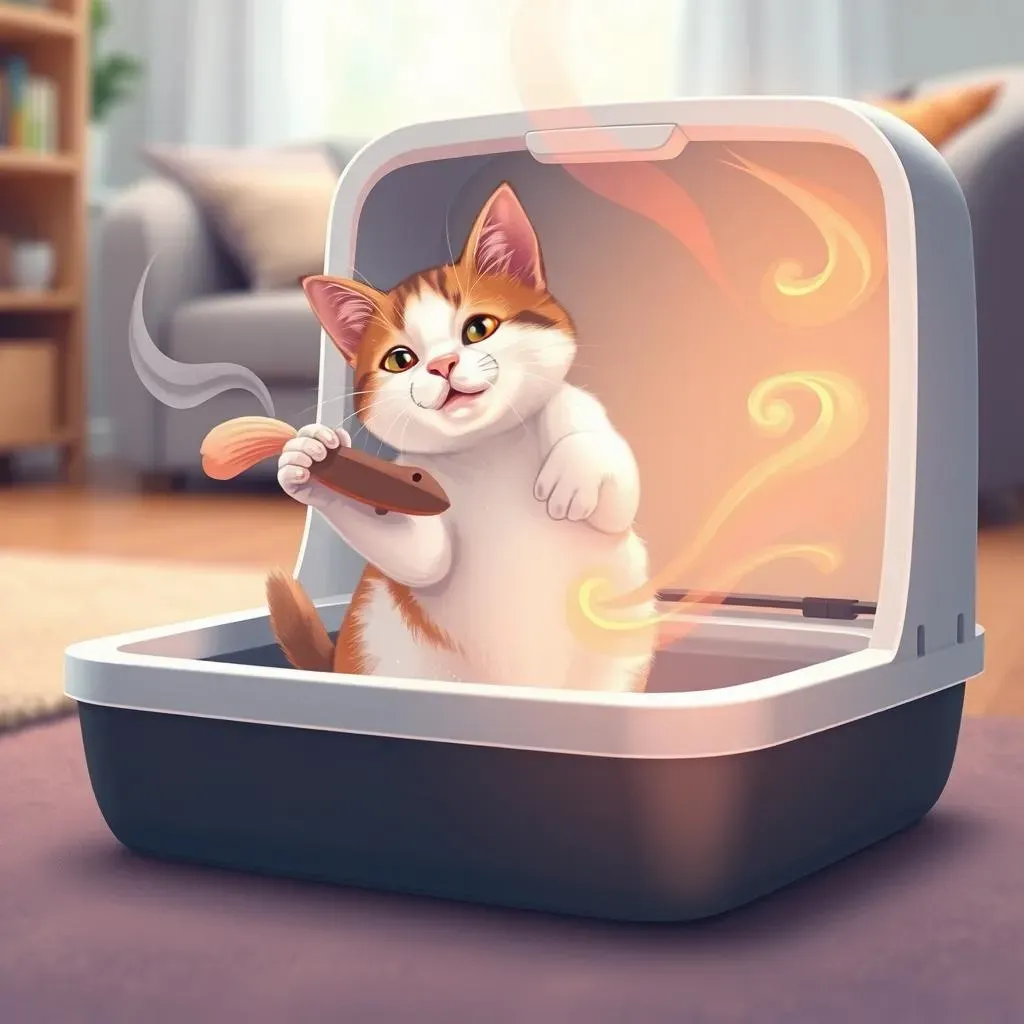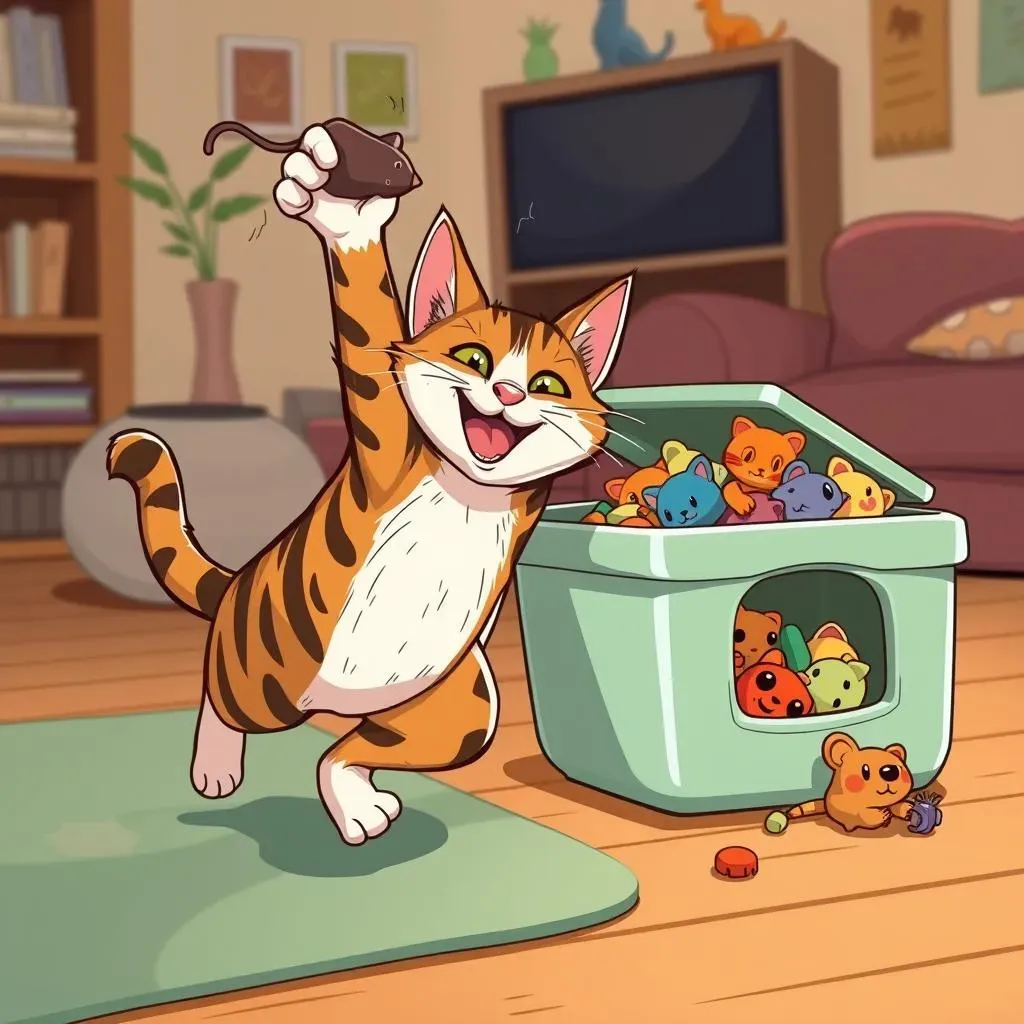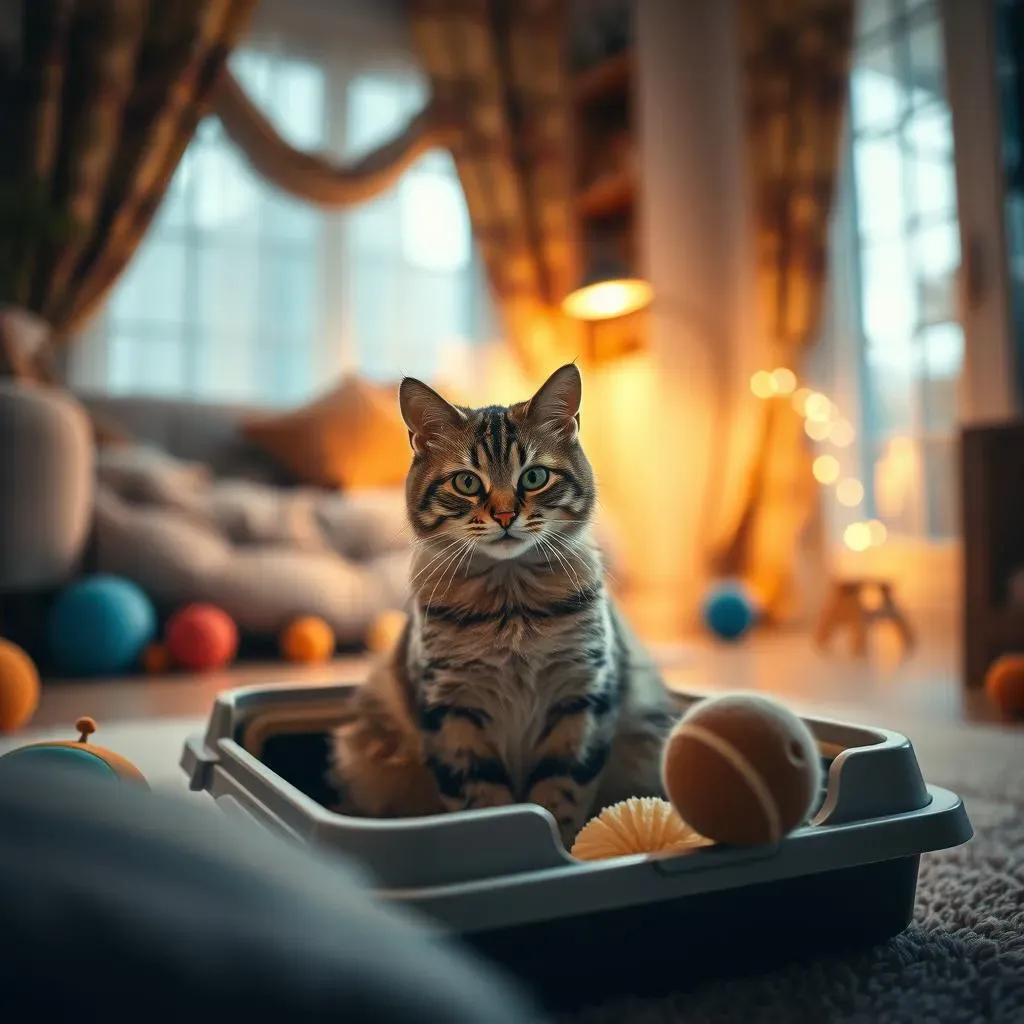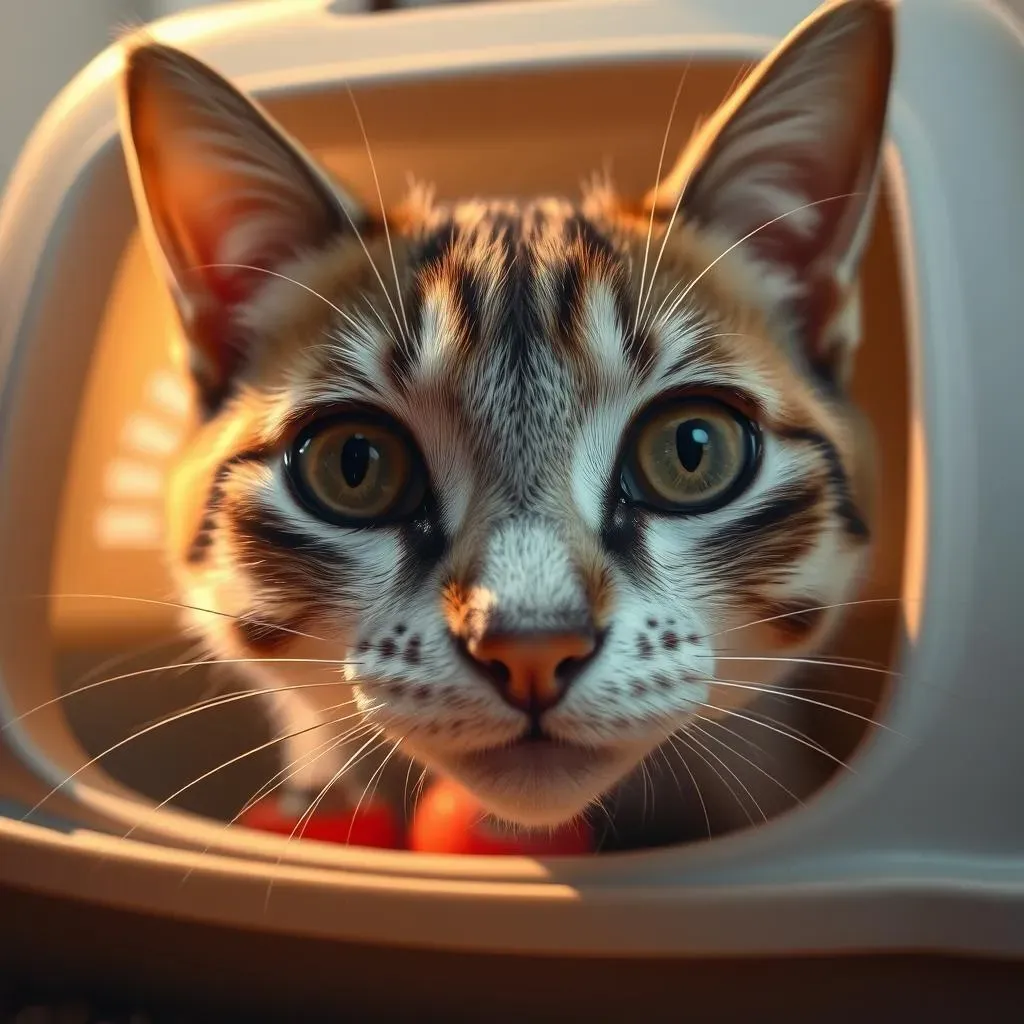Table of Contents
Ever caught your feline friend dropping their favorite mouse toy into their litter box and wondered, "Why does my cat bring toys to the litter box?" It's a common yet perplexing behavior that leaves many cat owners scratching their heads. But don't worry, you're not alone in this kitty conundrum! Cats, with their enigmatic ways, often display behaviors that seem bizarre to us humans, and this is just one of them.
Understanding Your Cat's Fascination with the Litter Box

Understanding Your Cat's Fascination with the Litter Box
The Litter Box: More Than Just a Toilet
To truly grasp why your cat might be treating their litter box like a toy depository, it's essential to understand what the litter box represents to them. It's not just a place to do their business; it's a significant personal space, loaded with meaning and scent. Think of it as their bathroom and personal message board all rolled into one.
Cats are highly scent-driven creatures, and their litter box is a prime location for leaving and detecting odors. When they bury their waste, they're not just being tidy; they're instinctively trying to mask their scent to avoid attracting predators. This behavior stems from their wild ancestors, who needed to hide their presence to survive. So, the litter box is a place where they feel vulnerable but also in control of their scent environment.
A Safe Haven or a Scent Central?
Some experts believe that cats may associate the litter box with safety and security. In a multi-cat household, for example, a cat might feel the need to protect their resources, including their toys, by keeping them in a place they consider safe. The litter box, despite its unsavory contents to us, might be the most secure spot in their eyes.
On the other hand, the concentration of their own scent in the litter box could be another factor. Cats have a strong sense of smell, and they use it to mark their territory and identify familiar objects. By placing their toys in the litter box, they might be imbuing them with their own scent, further solidifying their ownership and making them feel more secure. It's like adding their personal stamp to their favorite possessions.
Possible Reason | Explanation |
|---|---|
Resource Guarding | Protecting toys in a perceived safe space. |
Scent Marking | Imbuing toys with a familiar scent. |
Instinctual Behavior | Relating to burying and hiding. |
The Playful Hunter: How Your Cat's Toys Relate to Hunting Instincts

The Playful Hunter: How Your Cat's Toys Relate to Hunting Instincts
Unleashing the Inner Predator
Even though our domesticated cats live a life of luxury with readily available food, water, and shelter, their hunting instincts remain deeply ingrained. Playtime for cats is essentially a simulated hunt. Those adorable pounces, swats, and bunny kicks are all part of a sequence that, in the wild, would lead to capturing prey.
Toys become stand-ins for mice, birds, or insects, allowing your cat to practice and hone their hunting skills. The thrill of the chase, the satisfaction of the "kill" (even if it's just a toy mouse), and the subsequent "consumption" (carrying the toy around) are all vital components of their natural behavior.
Burying the Spoils: A Feline Tradition
Now, let's connect this back to the litter box. If your cat is successfully "hunting" their toys, it's not a huge leap to think they might want to protect their prize. In the wild, a cat would bury or hide their kill to keep it safe from scavengers or larger predators. The litter box, with its inherent association with burying, might seem like the perfect place to stash their hard-earned "prey."
Think of it this way: they've caught the mighty mouse toy, and now they need to ensure no one steals their trophy. The litter box, already a place where they instinctively bury things, becomes a convenient and seemingly secure hiding spot. It's a testament to their natural instincts overriding their domesticated lifestyle.
- Hunting Sequence: Stalk, chase, capture, kill, consume.
- Toys as Prey: Toys simulate the experience of hunting.
- Litter Box as Cache: A place to hide and protect "prey."
Why the Litter Box? Exploring Reasons for Toy Placement

Why the Litter Box? Exploring Reasons for Toy Placement
Is it the safest place in the house?
so your cat's a hunter, and the litter box is a potential hiding spot. But why the litter box specifically? Think about it from your cat's perspective. Is it the quietest place in the house? The most secluded? Maybe it's the spot where they feel they have the best vantage point, or perhaps it is away from other pets? Sometimes, the reason is as simple as convenience. The litter box is *there*, and when they're done playing, it's an easy place to stash their "kill."
Also, consider the vertical aspect of your home. Cats love to be up high, observing their surroundings. If the litter box is in a location that provides a good view or is near a cat tree or other elevated perch, it might be a strategic choice for toy storage. They can keep an eye on their toys while also keeping an eye on their kingdom. It's all about security and control.
Scent Association and Comfort
We've touched on scent before, but it's worth diving a little deeper. Cats have scent glands all over their bodies, and they use these glands to mark their territory and belongings. By rubbing against objects, they're essentially saying, "This is mine!" The litter box, being a place saturated with their own scent, might feel like a particularly safe and familiar place to them.
Therefore, placing their toys in the litter box could be a way of further imbuing those toys with their personal scent, making them feel even more secure and comforted. It's like creating a little nest of familiar smells. This is especially true for cats who might be anxious or insecure. The act of surrounding themselves with their own scent can be incredibly soothing.
Sudden Behavioral Changes: When Bringing Toys to the Litter Box Signals a Problem

Sudden Behavioral Changes: When Bringing Toys to the Litter Box Signals a Problem
When Playtime Becomes a Worry
While a cat stashing toys in their litter box might seem like a harmless quirk, a sudden behavioral change can sometimes indicate an underlying issue. If your cat has never exhibited this behavior before and suddenly starts using the litter box as a toy depository, it's worth paying closer attention. Changes in behavior are often a cat's way of communicating that something is amiss, whether it's a medical problem, stress, or anxiety. Don't dismiss it as just a funny habit; it could be a sign that your furry friend needs some extra care and attention.
Consider the context: Has there been a change in the household? A new pet? A new person? Have you moved furniture around? Any of these changes can cause stress for a cat, leading to changes in their behavior. Also, watch for other signs, such as changes in appetite, litter box habits (other than the toy thing), grooming habits, or overall activity level. These clues can help you determine if the toy-burying behavior is part of a larger problem.
Health Concerns and Stress Triggers
One possible reason for a sudden change in behavior is a health issue. Certain medical conditions can cause cats to act differently, and sometimes these changes manifest in unusual ways, like stashing toys in the litter box. For example, a urinary tract infection might make the litter box a more significant focus for them, leading them to associate it with other activities, like play.
Stress and anxiety are also common triggers for behavioral changes in cats. If your cat is feeling stressed, they might seek comfort in familiar routines or objects, and the litter box, with its strong scent associations, might become a focal point for their anxiety. The act of burying toys could be a way of self-soothing or trying to regain a sense of control in a stressful situation.
- Possible Health Concerns: Urinary tract infections, hyperthyroidism, cognitive dysfunction.
- Possible Stress Triggers: Changes in the household, new pets, loud noises, lack of environmental enrichment.
- Other Signs to Watch For: Changes in appetite, litter box habits, grooming habits, activity level.
When to Consult a Vet
If you're concerned about your cat's sudden change in behavior, it's always best to consult with your veterinarian. They can perform a physical exam and run tests to rule out any underlying medical conditions. They can also provide advice on how to manage stress and anxiety in your cat.
Don't hesitate to seek professional help. Your vet is your best resource for understanding your cat's health and behavior. They can help you determine if the toy-burying behavior is a harmless quirk or a sign of a more serious problem. Early intervention can often make a big difference in your cat's well-being.
Situation | Action |
|---|---|
Sudden behavior change | Consult your veterinarian |
Other concerning symptoms present | Consult your veterinarian |
Behavior persists despite environmental changes | Consult your veterinarian |
Unlocking the Mystery of the Toy-Filled Litter Box
So, why does my cat bring toys to the litter box? As we've explored, the reasons can range from harmless playfulness rooted in hunting instincts to a signal of underlying stress or health concerns. By observing your cat's behavior, noting any changes, and consulting with your vet when necessary, you can gain valuable insights into their well-being. Understanding the "why" behind this quirky habit strengthens your bond with your feline companion and ensures their happiness and health. Remember, every cat is an individual, and their behaviors are often a unique expression of their personality and needs.